Analysis of Empowering Users in Health and Social Care: Unit 09 Report
VerifiedAdded on 2023/01/13
|17
|4322
|27
Report
AI Summary
This report provides a detailed analysis of user empowerment within the health and social care sector. It begins by exploring relevant UK legislation, such as the Equality Act and the Care Act 2014, and examines the role of organizational policies in promoting user rights. The report then delves into factors contributing to non-participation, loss of independence, and social exclusion for vulnerable individuals, with a focus on physical and mental disabilities and non-earning status. It examines how organizational processes and systems can be managed to enhance user participation and independence, emphasizing the importance of trained employees, performance, and feedback. The report also addresses the tensions between individual rights to choice and independence and the service provider's duty of protection, using a case study to identify risks to individuals. Finally, it reviews legislation and policies related to medication handling and evaluates the effectiveness of procedures in health and social care settings, offering a comprehensive overview of best practices and challenges in empowering service users.
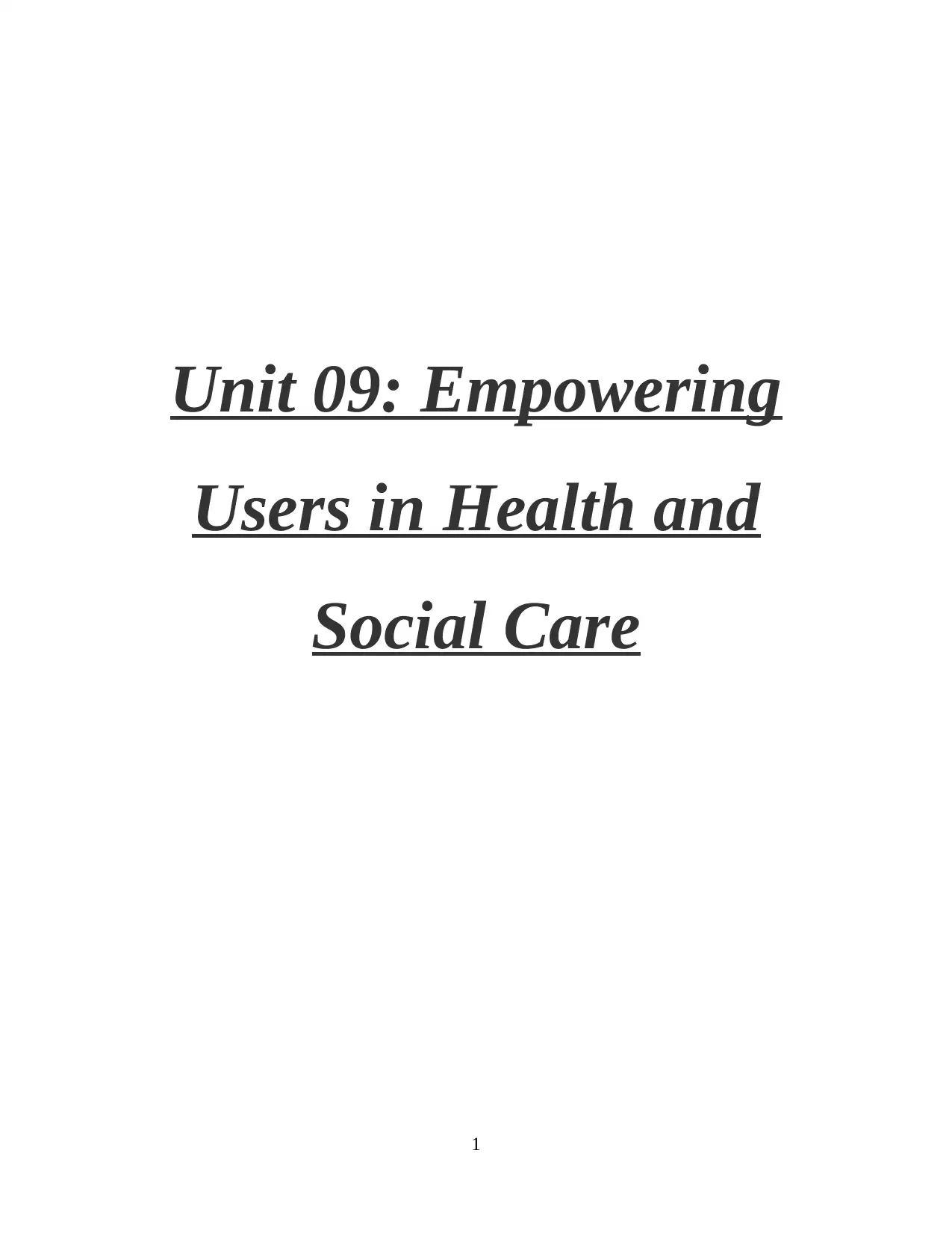
Unit 09: Empowering
Users in Health and
Social Care
1
Users in Health and
Social Care
1
Paraphrase This Document
Need a fresh take? Get an instant paraphrase of this document with our AI Paraphraser
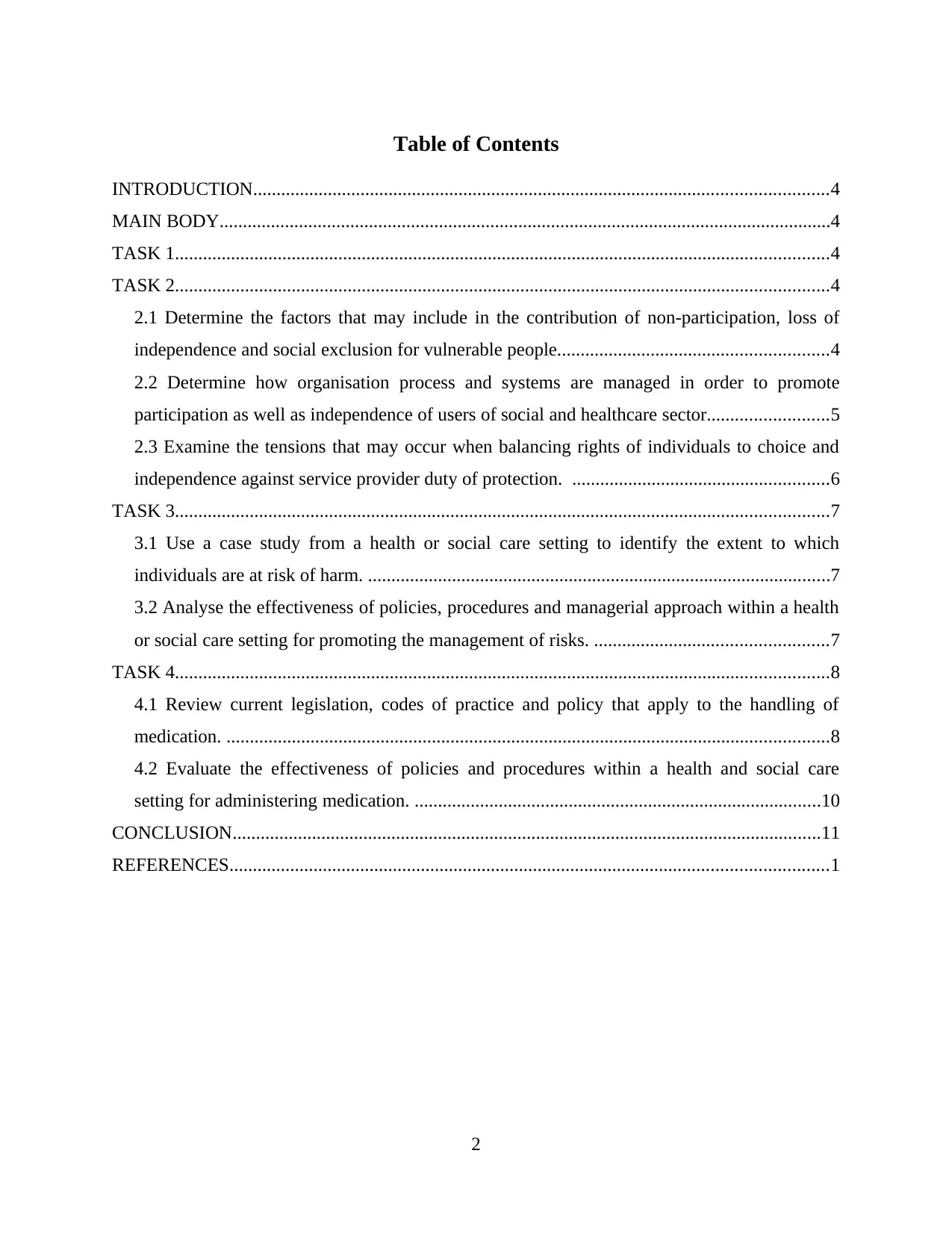
Table of Contents
INTRODUCTION...........................................................................................................................4
MAIN BODY...................................................................................................................................4
TASK 1............................................................................................................................................4
TASK 2............................................................................................................................................4
2.1 Determine the factors that may include in the contribution of non-participation, loss of
independence and social exclusion for vulnerable people..........................................................4
2.2 Determine how organisation process and systems are managed in order to promote
participation as well as independence of users of social and healthcare sector..........................5
2.3 Examine the tensions that may occur when balancing rights of individuals to choice and
independence against service provider duty of protection. .......................................................6
TASK 3............................................................................................................................................7
3.1 Use a case study from a health or social care setting to identify the extent to which
individuals are at risk of harm. ...................................................................................................7
3.2 Analyse the effectiveness of policies, procedures and managerial approach within a health
or social care setting for promoting the management of risks. ..................................................7
TASK 4............................................................................................................................................8
4.1 Review current legislation, codes of practice and policy that apply to the handling of
medication. .................................................................................................................................8
4.2 Evaluate the effectiveness of policies and procedures within a health and social care
setting for administering medication. .......................................................................................10
CONCLUSION..............................................................................................................................11
REFERENCES................................................................................................................................1
2
INTRODUCTION...........................................................................................................................4
MAIN BODY...................................................................................................................................4
TASK 1............................................................................................................................................4
TASK 2............................................................................................................................................4
2.1 Determine the factors that may include in the contribution of non-participation, loss of
independence and social exclusion for vulnerable people..........................................................4
2.2 Determine how organisation process and systems are managed in order to promote
participation as well as independence of users of social and healthcare sector..........................5
2.3 Examine the tensions that may occur when balancing rights of individuals to choice and
independence against service provider duty of protection. .......................................................6
TASK 3............................................................................................................................................7
3.1 Use a case study from a health or social care setting to identify the extent to which
individuals are at risk of harm. ...................................................................................................7
3.2 Analyse the effectiveness of policies, procedures and managerial approach within a health
or social care setting for promoting the management of risks. ..................................................7
TASK 4............................................................................................................................................8
4.1 Review current legislation, codes of practice and policy that apply to the handling of
medication. .................................................................................................................................8
4.2 Evaluate the effectiveness of policies and procedures within a health and social care
setting for administering medication. .......................................................................................10
CONCLUSION..............................................................................................................................11
REFERENCES................................................................................................................................1
2
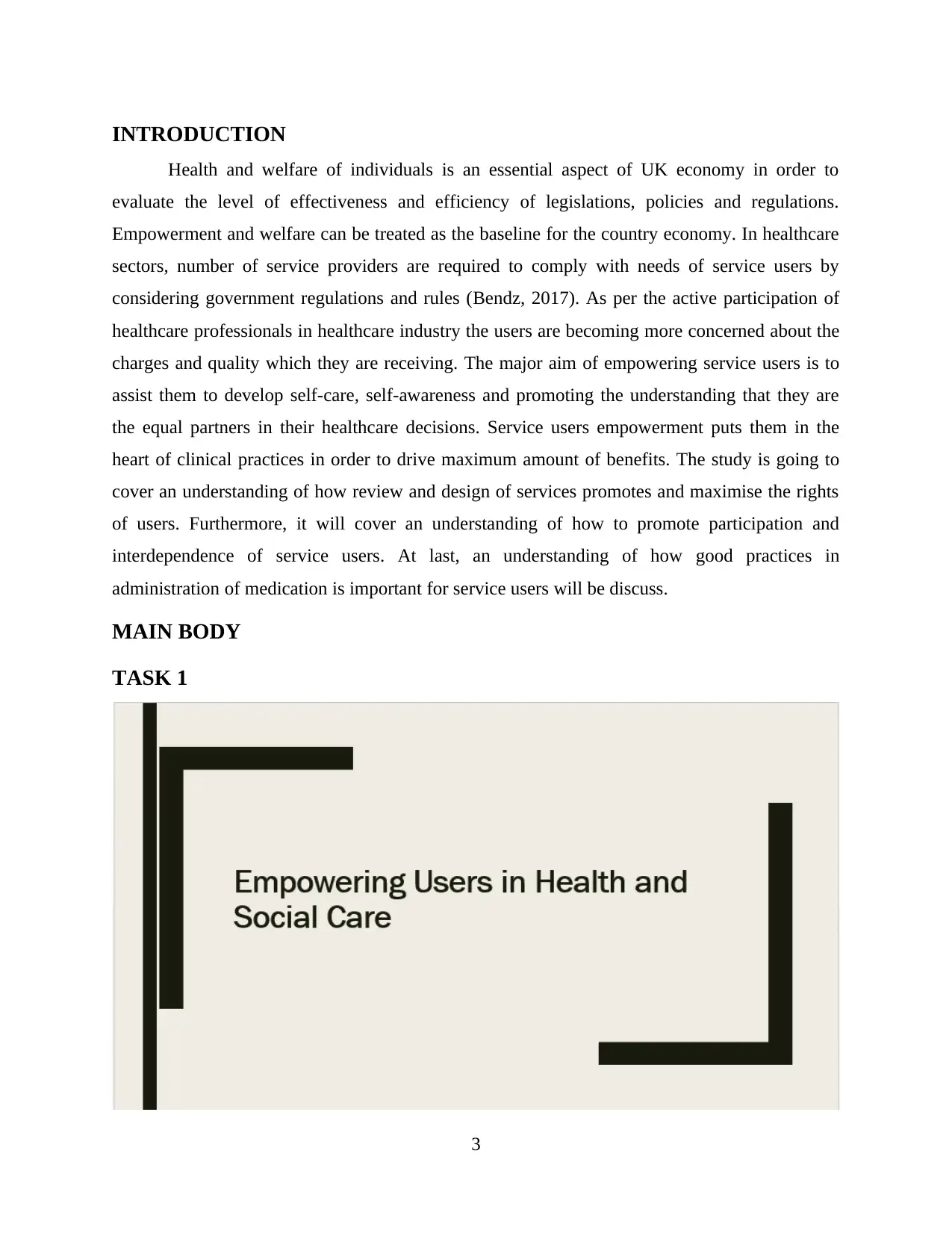
INTRODUCTION
Health and welfare of individuals is an essential aspect of UK economy in order to
evaluate the level of effectiveness and efficiency of legislations, policies and regulations.
Empowerment and welfare can be treated as the baseline for the country economy. In healthcare
sectors, number of service providers are required to comply with needs of service users by
considering government regulations and rules (Bendz, 2017). As per the active participation of
healthcare professionals in healthcare industry the users are becoming more concerned about the
charges and quality which they are receiving. The major aim of empowering service users is to
assist them to develop self-care, self-awareness and promoting the understanding that they are
the equal partners in their healthcare decisions. Service users empowerment puts them in the
heart of clinical practices in order to drive maximum amount of benefits. The study is going to
cover an understanding of how review and design of services promotes and maximise the rights
of users. Furthermore, it will cover an understanding of how to promote participation and
interdependence of service users. At last, an understanding of how good practices in
administration of medication is important for service users will be discuss.
MAIN BODY
TASK 1
3
Health and welfare of individuals is an essential aspect of UK economy in order to
evaluate the level of effectiveness and efficiency of legislations, policies and regulations.
Empowerment and welfare can be treated as the baseline for the country economy. In healthcare
sectors, number of service providers are required to comply with needs of service users by
considering government regulations and rules (Bendz, 2017). As per the active participation of
healthcare professionals in healthcare industry the users are becoming more concerned about the
charges and quality which they are receiving. The major aim of empowering service users is to
assist them to develop self-care, self-awareness and promoting the understanding that they are
the equal partners in their healthcare decisions. Service users empowerment puts them in the
heart of clinical practices in order to drive maximum amount of benefits. The study is going to
cover an understanding of how review and design of services promotes and maximise the rights
of users. Furthermore, it will cover an understanding of how to promote participation and
interdependence of service users. At last, an understanding of how good practices in
administration of medication is important for service users will be discuss.
MAIN BODY
TASK 1
3
⊘ This is a preview!⊘
Do you want full access?
Subscribe today to unlock all pages.

Trusted by 1+ million students worldwide
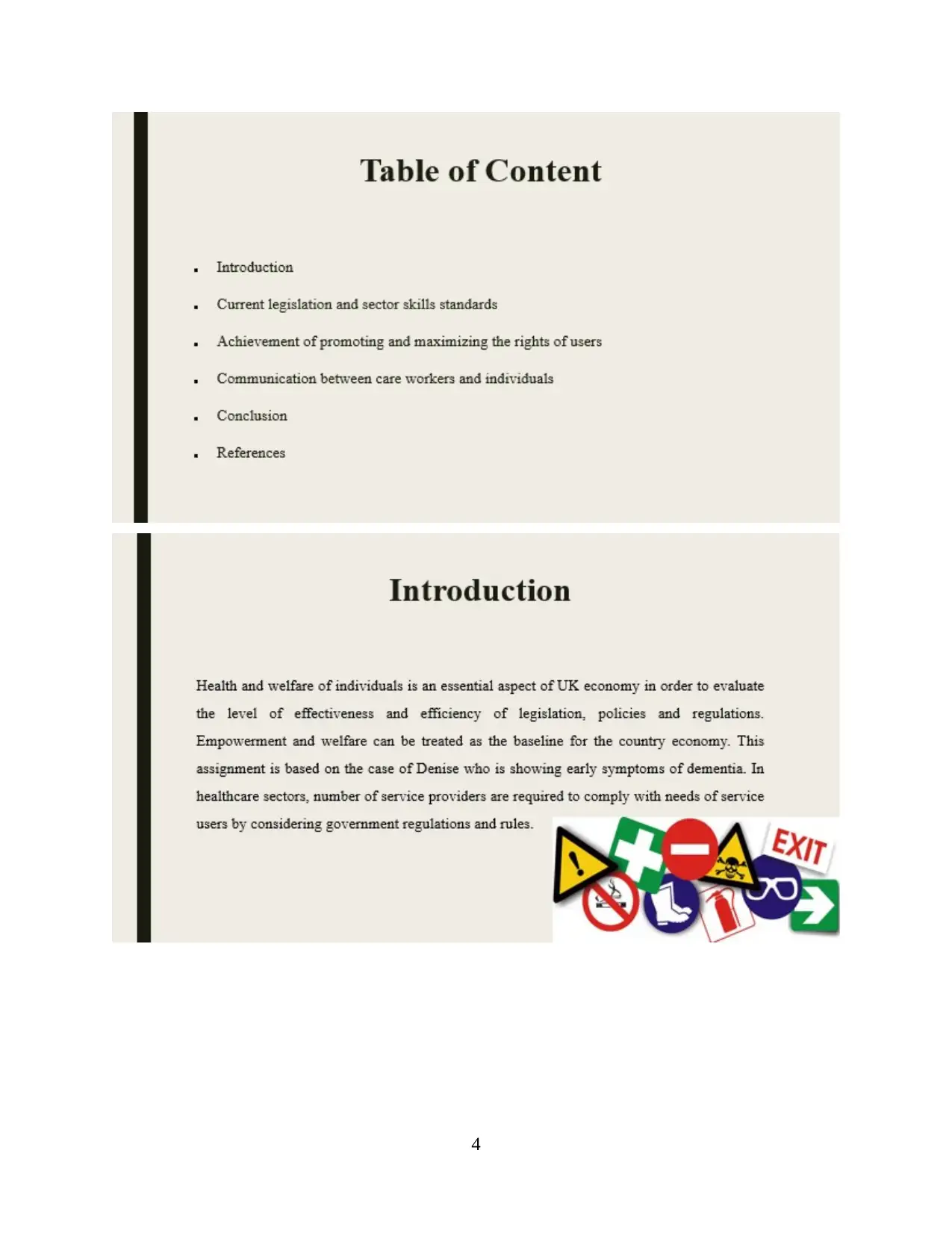
4
Paraphrase This Document
Need a fresh take? Get an instant paraphrase of this document with our AI Paraphraser
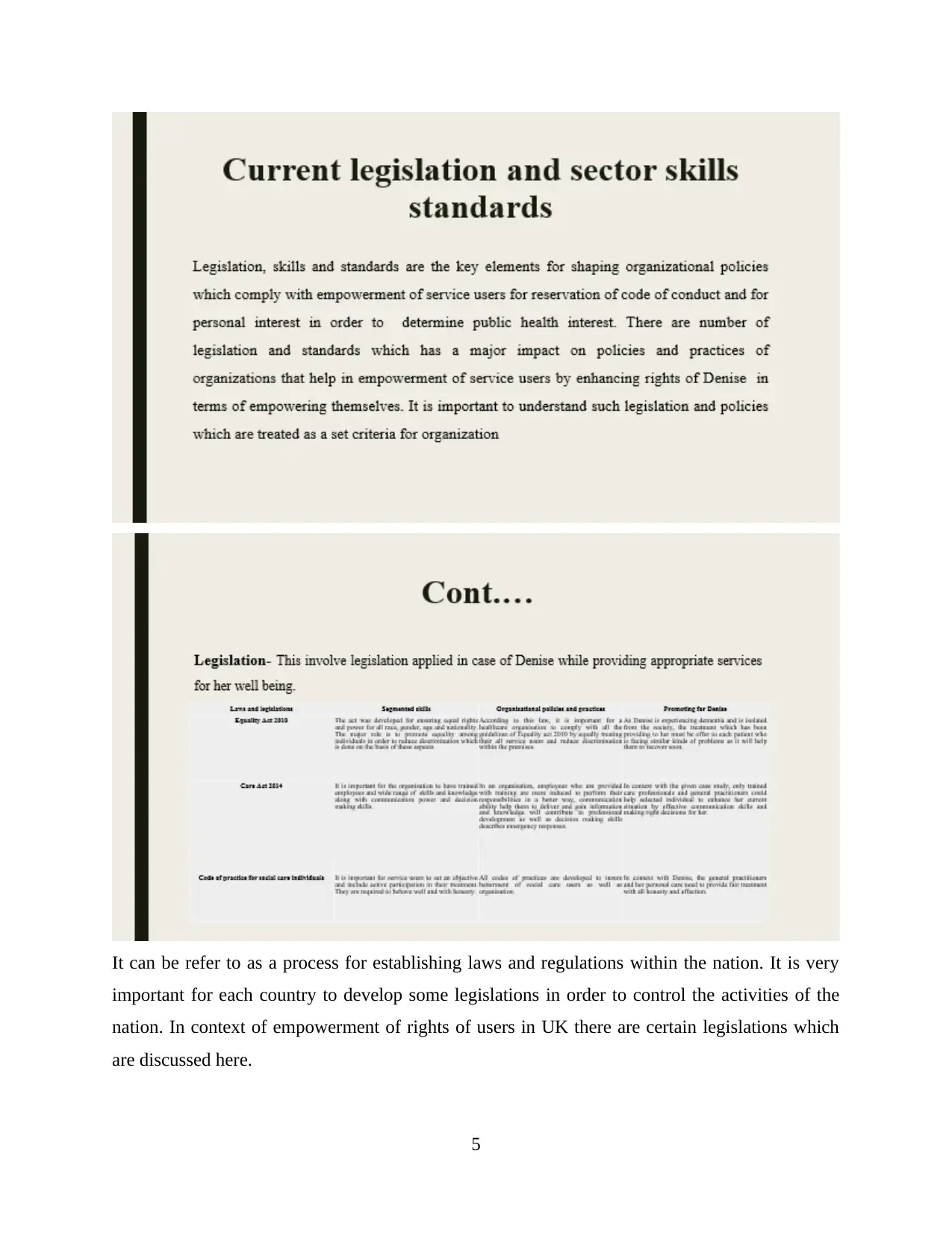
It can be refer to as a process for establishing laws and regulations within the nation. It is very
important for each country to develop some legislations in order to control the activities of the
nation. In context of empowerment of rights of users in UK there are certain legislations which
are discussed here.
5
important for each country to develop some legislations in order to control the activities of the
nation. In context of empowerment of rights of users in UK there are certain legislations which
are discussed here.
5
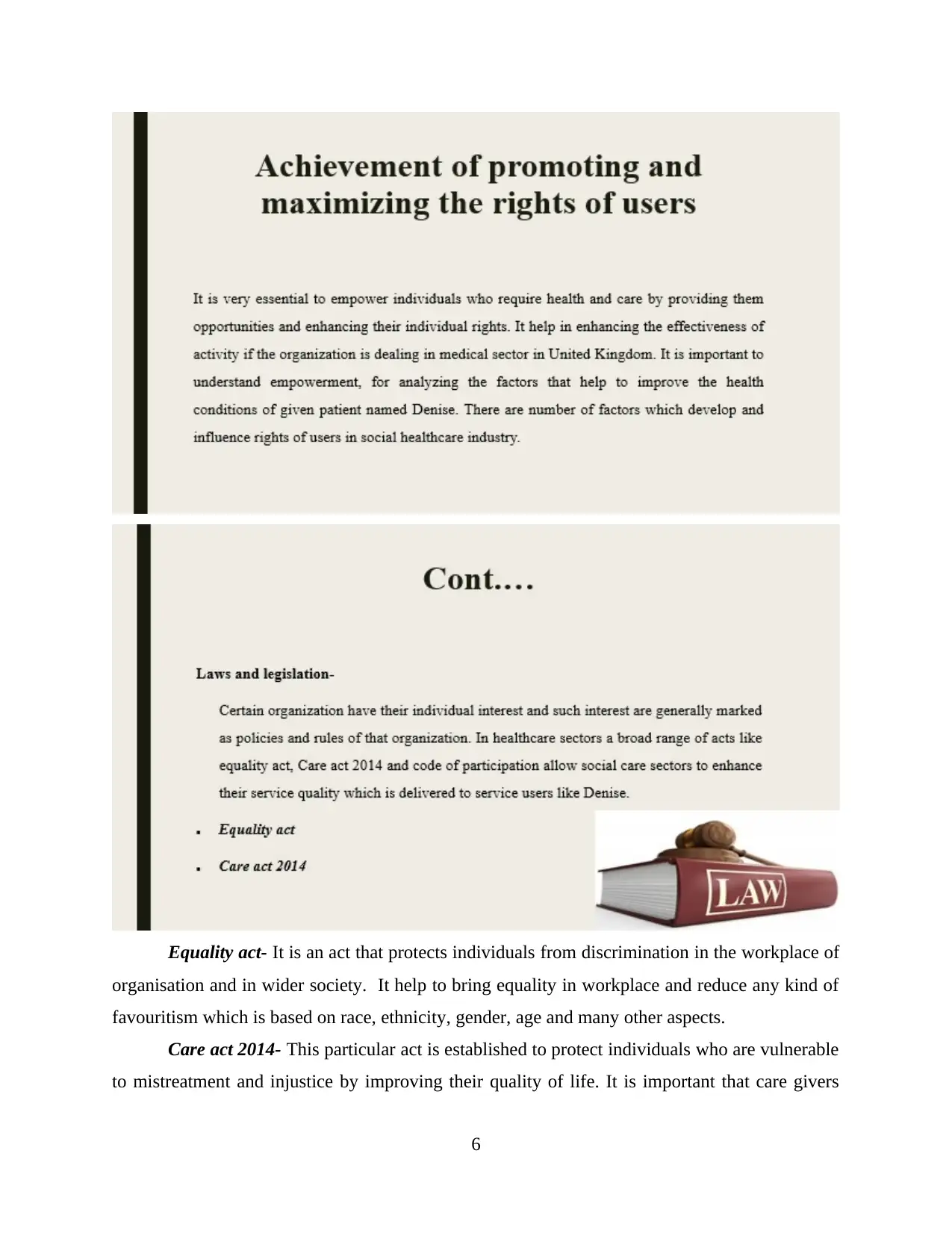
Equality act- It is an act that protects individuals from discrimination in the workplace of
organisation and in wider society. It help to bring equality in workplace and reduce any kind of
favouritism which is based on race, ethnicity, gender, age and many other aspects.
Care act 2014- This particular act is established to protect individuals who are vulnerable
to mistreatment and injustice by improving their quality of life. It is important that care givers
6
organisation and in wider society. It help to bring equality in workplace and reduce any kind of
favouritism which is based on race, ethnicity, gender, age and many other aspects.
Care act 2014- This particular act is established to protect individuals who are vulnerable
to mistreatment and injustice by improving their quality of life. It is important that care givers
6
⊘ This is a preview!⊘
Do you want full access?
Subscribe today to unlock all pages.

Trusted by 1+ million students worldwide
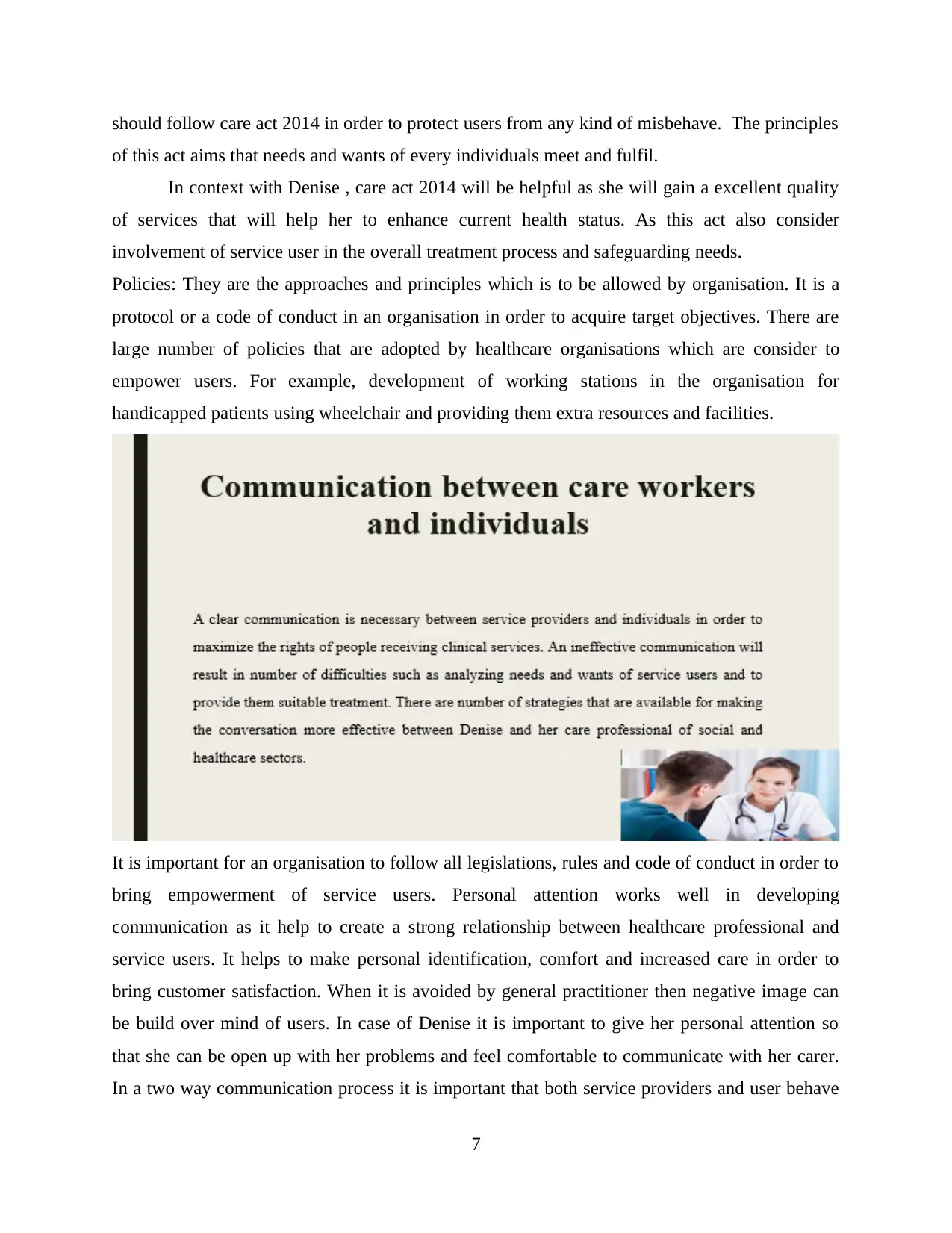
should follow care act 2014 in order to protect users from any kind of misbehave. The principles
of this act aims that needs and wants of every individuals meet and fulfil.
In context with Denise , care act 2014 will be helpful as she will gain a excellent quality
of services that will help her to enhance current health status. As this act also consider
involvement of service user in the overall treatment process and safeguarding needs.
Policies: They are the approaches and principles which is to be allowed by organisation. It is a
protocol or a code of conduct in an organisation in order to acquire target objectives. There are
large number of policies that are adopted by healthcare organisations which are consider to
empower users. For example, development of working stations in the organisation for
handicapped patients using wheelchair and providing them extra resources and facilities.
It is important for an organisation to follow all legislations, rules and code of conduct in order to
bring empowerment of service users. Personal attention works well in developing
communication as it help to create a strong relationship between healthcare professional and
service users. It helps to make personal identification, comfort and increased care in order to
bring customer satisfaction. When it is avoided by general practitioner then negative image can
be build over mind of users. In case of Denise it is important to give her personal attention so
that she can be open up with her problems and feel comfortable to communicate with her carer.
In a two way communication process it is important that both service providers and user behave
7
of this act aims that needs and wants of every individuals meet and fulfil.
In context with Denise , care act 2014 will be helpful as she will gain a excellent quality
of services that will help her to enhance current health status. As this act also consider
involvement of service user in the overall treatment process and safeguarding needs.
Policies: They are the approaches and principles which is to be allowed by organisation. It is a
protocol or a code of conduct in an organisation in order to acquire target objectives. There are
large number of policies that are adopted by healthcare organisations which are consider to
empower users. For example, development of working stations in the organisation for
handicapped patients using wheelchair and providing them extra resources and facilities.
It is important for an organisation to follow all legislations, rules and code of conduct in order to
bring empowerment of service users. Personal attention works well in developing
communication as it help to create a strong relationship between healthcare professional and
service users. It helps to make personal identification, comfort and increased care in order to
bring customer satisfaction. When it is avoided by general practitioner then negative image can
be build over mind of users. In case of Denise it is important to give her personal attention so
that she can be open up with her problems and feel comfortable to communicate with her carer.
In a two way communication process it is important that both service providers and user behave
7
Paraphrase This Document
Need a fresh take? Get an instant paraphrase of this document with our AI Paraphraser
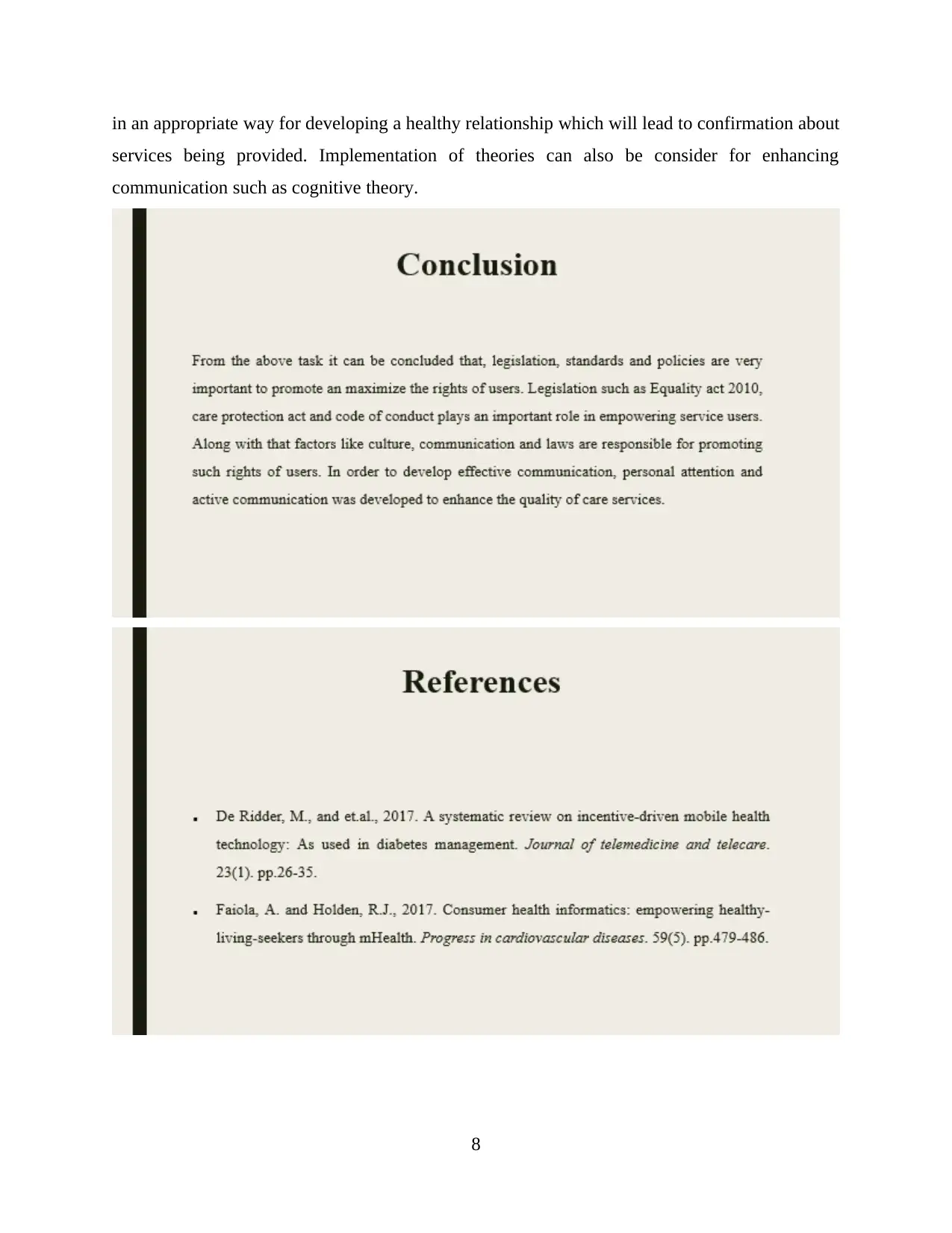
in an appropriate way for developing a healthy relationship which will lead to confirmation about
services being provided. Implementation of theories can also be consider for enhancing
communication such as cognitive theory.
8
services being provided. Implementation of theories can also be consider for enhancing
communication such as cognitive theory.
8
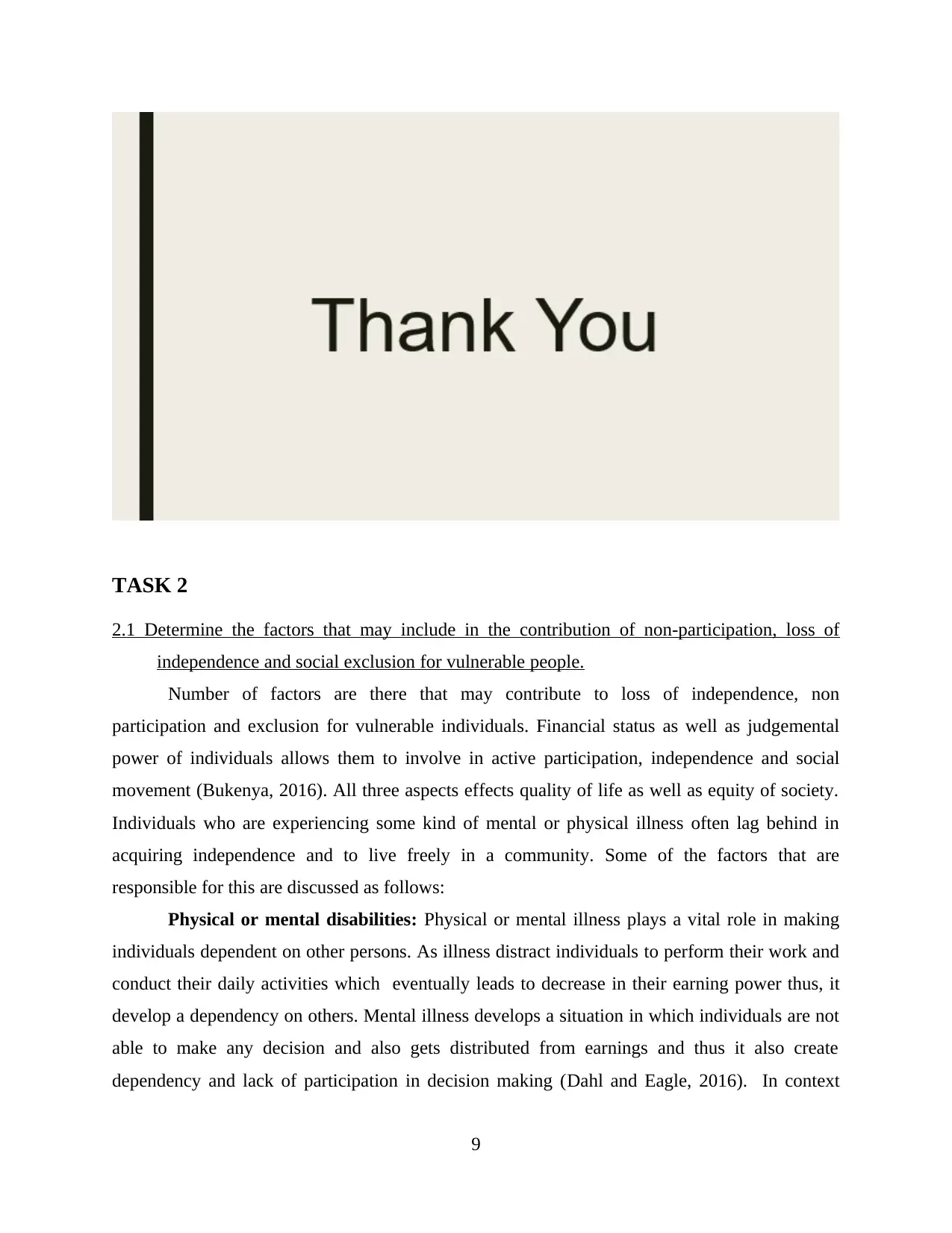
TASK 2
2.1 Determine the factors that may include in the contribution of non-participation, loss of
independence and social exclusion for vulnerable people.
Number of factors are there that may contribute to loss of independence, non
participation and exclusion for vulnerable individuals. Financial status as well as judgemental
power of individuals allows them to involve in active participation, independence and social
movement (Bukenya, 2016). All three aspects effects quality of life as well as equity of society.
Individuals who are experiencing some kind of mental or physical illness often lag behind in
acquiring independence and to live freely in a community. Some of the factors that are
responsible for this are discussed as follows:
Physical or mental disabilities: Physical or mental illness plays a vital role in making
individuals dependent on other persons. As illness distract individuals to perform their work and
conduct their daily activities which eventually leads to decrease in their earning power thus, it
develop a dependency on others. Mental illness develops a situation in which individuals are not
able to make any decision and also gets distributed from earnings and thus it also create
dependency and lack of participation in decision making (Dahl and Eagle, 2016). In context
9
2.1 Determine the factors that may include in the contribution of non-participation, loss of
independence and social exclusion for vulnerable people.
Number of factors are there that may contribute to loss of independence, non
participation and exclusion for vulnerable individuals. Financial status as well as judgemental
power of individuals allows them to involve in active participation, independence and social
movement (Bukenya, 2016). All three aspects effects quality of life as well as equity of society.
Individuals who are experiencing some kind of mental or physical illness often lag behind in
acquiring independence and to live freely in a community. Some of the factors that are
responsible for this are discussed as follows:
Physical or mental disabilities: Physical or mental illness plays a vital role in making
individuals dependent on other persons. As illness distract individuals to perform their work and
conduct their daily activities which eventually leads to decrease in their earning power thus, it
develop a dependency on others. Mental illness develops a situation in which individuals are not
able to make any decision and also gets distributed from earnings and thus it also create
dependency and lack of participation in decision making (Dahl and Eagle, 2016). In context
9
⊘ This is a preview!⊘
Do you want full access?
Subscribe today to unlock all pages.

Trusted by 1+ million students worldwide
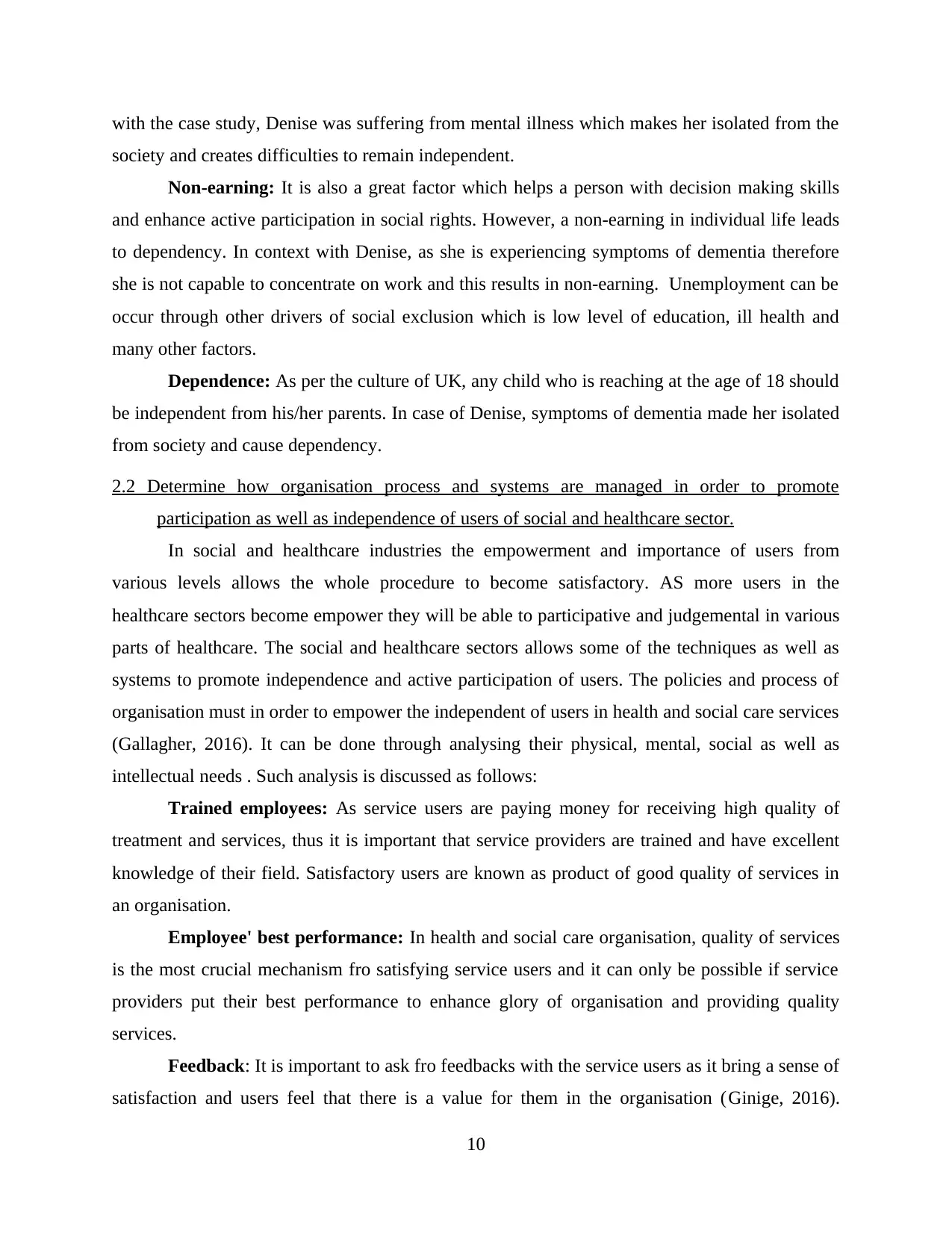
with the case study, Denise was suffering from mental illness which makes her isolated from the
society and creates difficulties to remain independent.
Non-earning: It is also a great factor which helps a person with decision making skills
and enhance active participation in social rights. However, a non-earning in individual life leads
to dependency. In context with Denise, as she is experiencing symptoms of dementia therefore
she is not capable to concentrate on work and this results in non-earning. Unemployment can be
occur through other drivers of social exclusion which is low level of education, ill health and
many other factors.
Dependence: As per the culture of UK, any child who is reaching at the age of 18 should
be independent from his/her parents. In case of Denise, symptoms of dementia made her isolated
from society and cause dependency.
2.2 Determine how organisation process and systems are managed in order to promote
participation as well as independence of users of social and healthcare sector.
In social and healthcare industries the empowerment and importance of users from
various levels allows the whole procedure to become satisfactory. AS more users in the
healthcare sectors become empower they will be able to participative and judgemental in various
parts of healthcare. The social and healthcare sectors allows some of the techniques as well as
systems to promote independence and active participation of users. The policies and process of
organisation must in order to empower the independent of users in health and social care services
(Gallagher, 2016). It can be done through analysing their physical, mental, social as well as
intellectual needs . Such analysis is discussed as follows:
Trained employees: As service users are paying money for receiving high quality of
treatment and services, thus it is important that service providers are trained and have excellent
knowledge of their field. Satisfactory users are known as product of good quality of services in
an organisation.
Employee' best performance: In health and social care organisation, quality of services
is the most crucial mechanism fro satisfying service users and it can only be possible if service
providers put their best performance to enhance glory of organisation and providing quality
services.
Feedback: It is important to ask fro feedbacks with the service users as it bring a sense of
satisfaction and users feel that there is a value for them in the organisation (Ginige, 2016).
10
society and creates difficulties to remain independent.
Non-earning: It is also a great factor which helps a person with decision making skills
and enhance active participation in social rights. However, a non-earning in individual life leads
to dependency. In context with Denise, as she is experiencing symptoms of dementia therefore
she is not capable to concentrate on work and this results in non-earning. Unemployment can be
occur through other drivers of social exclusion which is low level of education, ill health and
many other factors.
Dependence: As per the culture of UK, any child who is reaching at the age of 18 should
be independent from his/her parents. In case of Denise, symptoms of dementia made her isolated
from society and cause dependency.
2.2 Determine how organisation process and systems are managed in order to promote
participation as well as independence of users of social and healthcare sector.
In social and healthcare industries the empowerment and importance of users from
various levels allows the whole procedure to become satisfactory. AS more users in the
healthcare sectors become empower they will be able to participative and judgemental in various
parts of healthcare. The social and healthcare sectors allows some of the techniques as well as
systems to promote independence and active participation of users. The policies and process of
organisation must in order to empower the independent of users in health and social care services
(Gallagher, 2016). It can be done through analysing their physical, mental, social as well as
intellectual needs . Such analysis is discussed as follows:
Trained employees: As service users are paying money for receiving high quality of
treatment and services, thus it is important that service providers are trained and have excellent
knowledge of their field. Satisfactory users are known as product of good quality of services in
an organisation.
Employee' best performance: In health and social care organisation, quality of services
is the most crucial mechanism fro satisfying service users and it can only be possible if service
providers put their best performance to enhance glory of organisation and providing quality
services.
Feedback: It is important to ask fro feedbacks with the service users as it bring a sense of
satisfaction and users feel that there is a value for them in the organisation (Ginige, 2016).
10
Paraphrase This Document
Need a fresh take? Get an instant paraphrase of this document with our AI Paraphraser
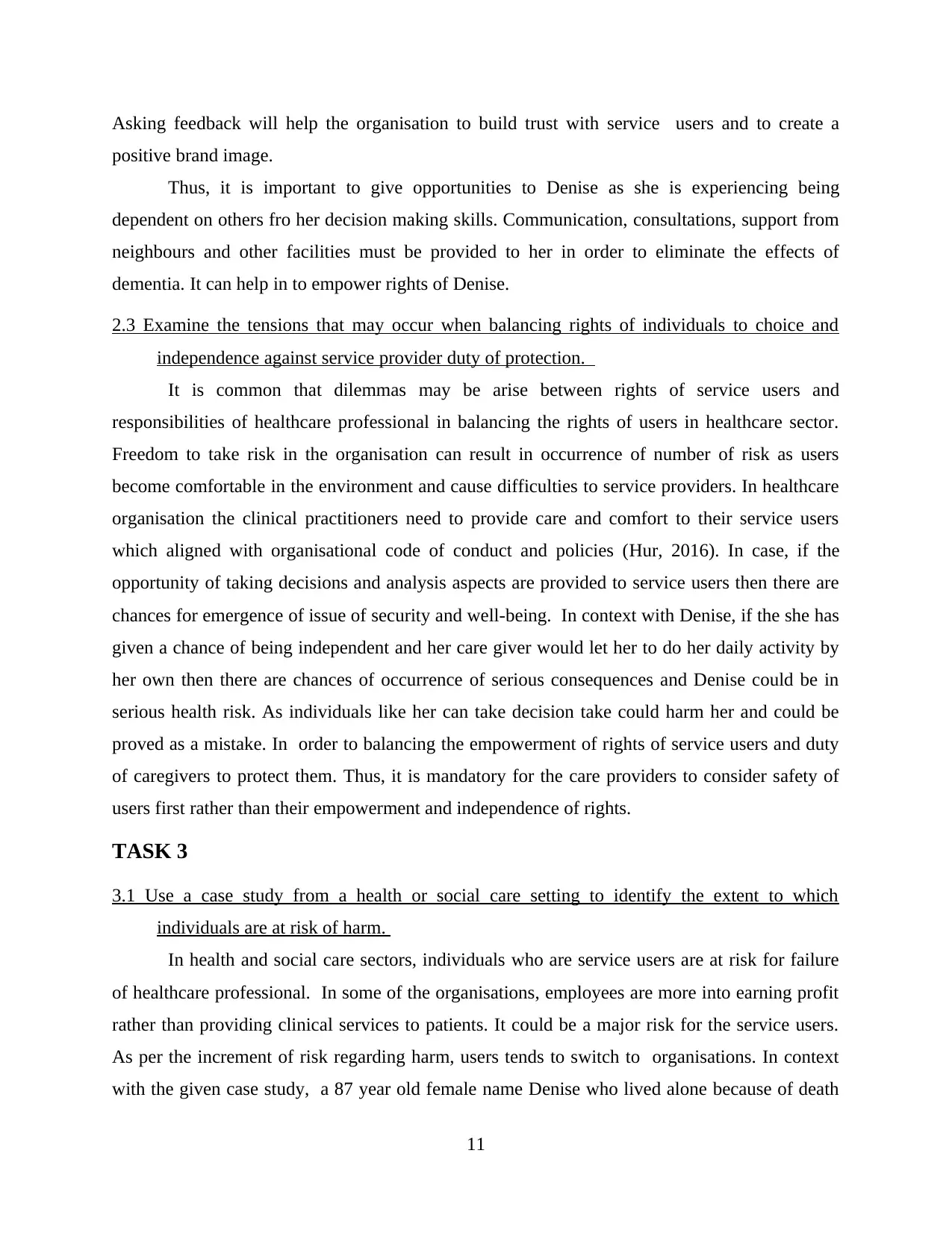
Asking feedback will help the organisation to build trust with service users and to create a
positive brand image.
Thus, it is important to give opportunities to Denise as she is experiencing being
dependent on others fro her decision making skills. Communication, consultations, support from
neighbours and other facilities must be provided to her in order to eliminate the effects of
dementia. It can help in to empower rights of Denise.
2.3 Examine the tensions that may occur when balancing rights of individuals to choice and
independence against service provider duty of protection.
It is common that dilemmas may be arise between rights of service users and
responsibilities of healthcare professional in balancing the rights of users in healthcare sector.
Freedom to take risk in the organisation can result in occurrence of number of risk as users
become comfortable in the environment and cause difficulties to service providers. In healthcare
organisation the clinical practitioners need to provide care and comfort to their service users
which aligned with organisational code of conduct and policies (Hur, 2016). In case, if the
opportunity of taking decisions and analysis aspects are provided to service users then there are
chances for emergence of issue of security and well-being. In context with Denise, if the she has
given a chance of being independent and her care giver would let her to do her daily activity by
her own then there are chances of occurrence of serious consequences and Denise could be in
serious health risk. As individuals like her can take decision take could harm her and could be
proved as a mistake. In order to balancing the empowerment of rights of service users and duty
of caregivers to protect them. Thus, it is mandatory for the care providers to consider safety of
users first rather than their empowerment and independence of rights.
TASK 3
3.1 Use a case study from a health or social care setting to identify the extent to which
individuals are at risk of harm.
In health and social care sectors, individuals who are service users are at risk for failure
of healthcare professional. In some of the organisations, employees are more into earning profit
rather than providing clinical services to patients. It could be a major risk for the service users.
As per the increment of risk regarding harm, users tends to switch to organisations. In context
with the given case study, a 87 year old female name Denise who lived alone because of death
11
positive brand image.
Thus, it is important to give opportunities to Denise as she is experiencing being
dependent on others fro her decision making skills. Communication, consultations, support from
neighbours and other facilities must be provided to her in order to eliminate the effects of
dementia. It can help in to empower rights of Denise.
2.3 Examine the tensions that may occur when balancing rights of individuals to choice and
independence against service provider duty of protection.
It is common that dilemmas may be arise between rights of service users and
responsibilities of healthcare professional in balancing the rights of users in healthcare sector.
Freedom to take risk in the organisation can result in occurrence of number of risk as users
become comfortable in the environment and cause difficulties to service providers. In healthcare
organisation the clinical practitioners need to provide care and comfort to their service users
which aligned with organisational code of conduct and policies (Hur, 2016). In case, if the
opportunity of taking decisions and analysis aspects are provided to service users then there are
chances for emergence of issue of security and well-being. In context with Denise, if the she has
given a chance of being independent and her care giver would let her to do her daily activity by
her own then there are chances of occurrence of serious consequences and Denise could be in
serious health risk. As individuals like her can take decision take could harm her and could be
proved as a mistake. In order to balancing the empowerment of rights of service users and duty
of caregivers to protect them. Thus, it is mandatory for the care providers to consider safety of
users first rather than their empowerment and independence of rights.
TASK 3
3.1 Use a case study from a health or social care setting to identify the extent to which
individuals are at risk of harm.
In health and social care sectors, individuals who are service users are at risk for failure
of healthcare professional. In some of the organisations, employees are more into earning profit
rather than providing clinical services to patients. It could be a major risk for the service users.
As per the increment of risk regarding harm, users tends to switch to organisations. In context
with the given case study, a 87 year old female name Denise who lived alone because of death
11
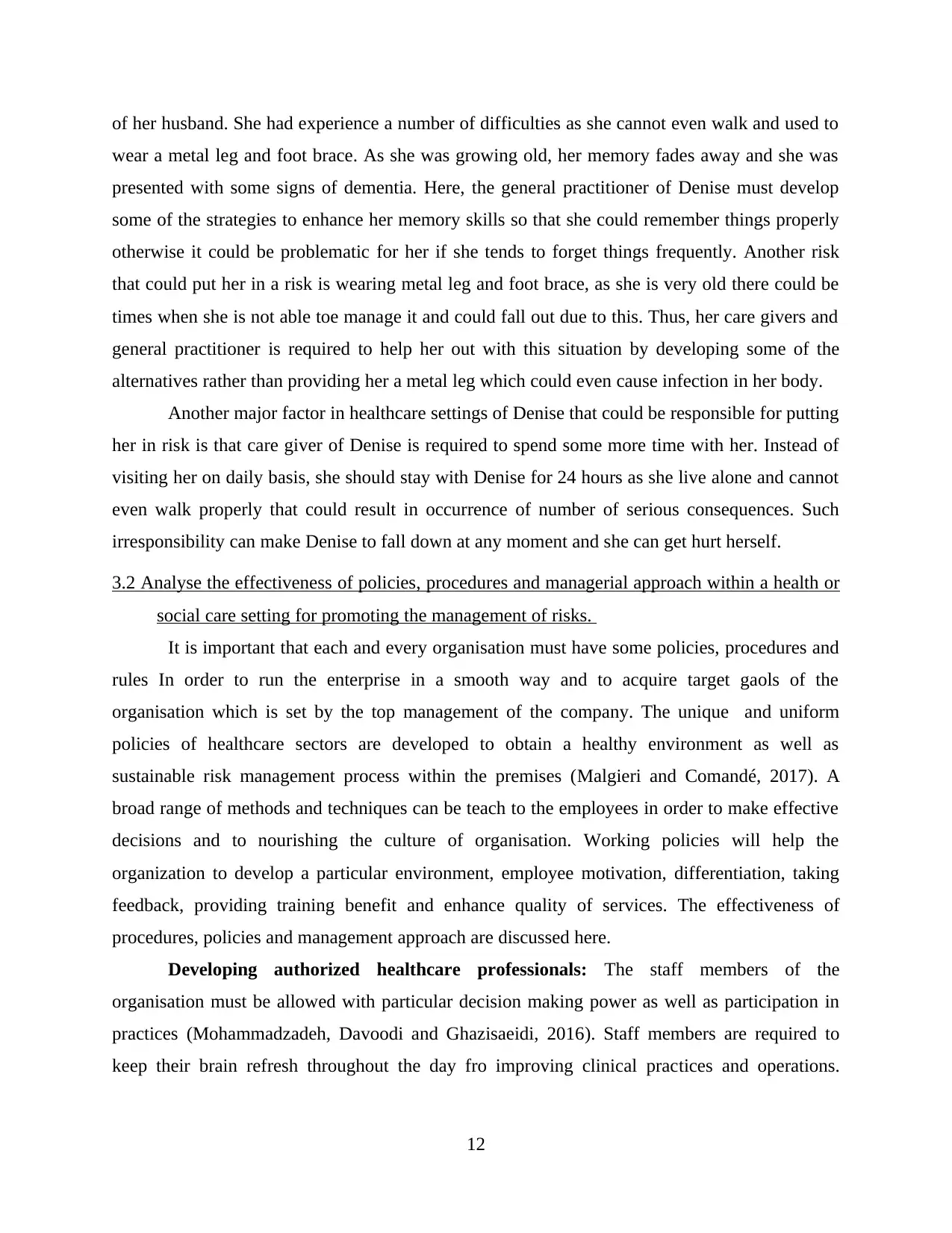
of her husband. She had experience a number of difficulties as she cannot even walk and used to
wear a metal leg and foot brace. As she was growing old, her memory fades away and she was
presented with some signs of dementia. Here, the general practitioner of Denise must develop
some of the strategies to enhance her memory skills so that she could remember things properly
otherwise it could be problematic for her if she tends to forget things frequently. Another risk
that could put her in a risk is wearing metal leg and foot brace, as she is very old there could be
times when she is not able toe manage it and could fall out due to this. Thus, her care givers and
general practitioner is required to help her out with this situation by developing some of the
alternatives rather than providing her a metal leg which could even cause infection in her body.
Another major factor in healthcare settings of Denise that could be responsible for putting
her in risk is that care giver of Denise is required to spend some more time with her. Instead of
visiting her on daily basis, she should stay with Denise for 24 hours as she live alone and cannot
even walk properly that could result in occurrence of number of serious consequences. Such
irresponsibility can make Denise to fall down at any moment and she can get hurt herself.
3.2 Analyse the effectiveness of policies, procedures and managerial approach within a health or
social care setting for promoting the management of risks.
It is important that each and every organisation must have some policies, procedures and
rules In order to run the enterprise in a smooth way and to acquire target gaols of the
organisation which is set by the top management of the company. The unique and uniform
policies of healthcare sectors are developed to obtain a healthy environment as well as
sustainable risk management process within the premises (Malgieri and Comandé, 2017). A
broad range of methods and techniques can be teach to the employees in order to make effective
decisions and to nourishing the culture of organisation. Working policies will help the
organization to develop a particular environment, employee motivation, differentiation, taking
feedback, providing training benefit and enhance quality of services. The effectiveness of
procedures, policies and management approach are discussed here.
Developing authorized healthcare professionals: The staff members of the
organisation must be allowed with particular decision making power as well as participation in
practices (Mohammadzadeh, Davoodi and Ghazisaeidi, 2016). Staff members are required to
keep their brain refresh throughout the day fro improving clinical practices and operations.
12
wear a metal leg and foot brace. As she was growing old, her memory fades away and she was
presented with some signs of dementia. Here, the general practitioner of Denise must develop
some of the strategies to enhance her memory skills so that she could remember things properly
otherwise it could be problematic for her if she tends to forget things frequently. Another risk
that could put her in a risk is wearing metal leg and foot brace, as she is very old there could be
times when she is not able toe manage it and could fall out due to this. Thus, her care givers and
general practitioner is required to help her out with this situation by developing some of the
alternatives rather than providing her a metal leg which could even cause infection in her body.
Another major factor in healthcare settings of Denise that could be responsible for putting
her in risk is that care giver of Denise is required to spend some more time with her. Instead of
visiting her on daily basis, she should stay with Denise for 24 hours as she live alone and cannot
even walk properly that could result in occurrence of number of serious consequences. Such
irresponsibility can make Denise to fall down at any moment and she can get hurt herself.
3.2 Analyse the effectiveness of policies, procedures and managerial approach within a health or
social care setting for promoting the management of risks.
It is important that each and every organisation must have some policies, procedures and
rules In order to run the enterprise in a smooth way and to acquire target gaols of the
organisation which is set by the top management of the company. The unique and uniform
policies of healthcare sectors are developed to obtain a healthy environment as well as
sustainable risk management process within the premises (Malgieri and Comandé, 2017). A
broad range of methods and techniques can be teach to the employees in order to make effective
decisions and to nourishing the culture of organisation. Working policies will help the
organization to develop a particular environment, employee motivation, differentiation, taking
feedback, providing training benefit and enhance quality of services. The effectiveness of
procedures, policies and management approach are discussed here.
Developing authorized healthcare professionals: The staff members of the
organisation must be allowed with particular decision making power as well as participation in
practices (Mohammadzadeh, Davoodi and Ghazisaeidi, 2016). Staff members are required to
keep their brain refresh throughout the day fro improving clinical practices and operations.
12
⊘ This is a preview!⊘
Do you want full access?
Subscribe today to unlock all pages.

Trusted by 1+ million students worldwide
1 out of 17
Related Documents
Your All-in-One AI-Powered Toolkit for Academic Success.
+13062052269
info@desklib.com
Available 24*7 on WhatsApp / Email
![[object Object]](/_next/static/media/star-bottom.7253800d.svg)
Unlock your academic potential
Copyright © 2020–2025 A2Z Services. All Rights Reserved. Developed and managed by ZUCOL.





